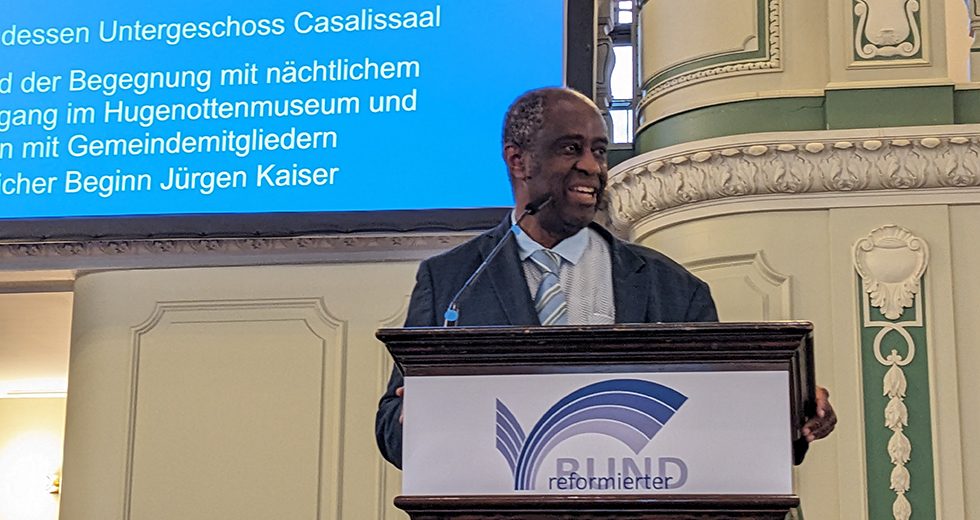Nyomi addresses Reformed Alliance assembly
Posted on April 26, 2024 by Phil Tanis

Setri Nyomi, interim general secretary of the World Communion of Reformed Churches (WCRC), addressed the Assembly of the Reformed Alliance (Reformierter Bund) in Berlin on 25 April, presenting a speech entitled “Reformed Identities – A Global Perspective.”
Based on the theme of the Assembly, Nyomi addressed two of its dimensions:
- When we talk about identity, some people have the notion that it means we could describe ourselves as Reformed in a particular way which distinguishes us from other religious bodies or other Christian families. For example, making a clear contrast between Reformed and Lutherans or Reformed and Roman Catholics.
- The question of identity in the singular versus identities in the plural. Is there a uniform identity that Reformed churches have and can be recognizable globally, or even nationally in one country?
“We have no hesitation about the claim that as Reformed, we are always reforming – impacted by the different ages and eras as well as the cultural contexts and existential challenges we find ourselves in; we are one family of churches and yet we will not always do things in the same way as our 16th century forbears,” Nyomi said. “Or the Reformed Church in Hannover may not always see themselves in the way the Reformed churches carry themselves in Vanuatu or in Anloga, Ghana, or in Buenos Aires, Argentina. So, we talk about identities.”
“We also value our ecumenical leanings. We say, ‘To be Reformed is to be ecumenical,’” he said. “Therefore, holding on to our distinctives as a badge that separates us from others is not part of our values.”
Nyomi then noted eight items as important for “understanding who we are as Reformed.”
- Creeds, confessions, and catechisms – great affirmations of what we believe and how we respond to the signs of the times
- Unity of the realm of God – not secular and divine as separate entities.
- Christian life is a vocation – the priesthood of all believers.
- We live out our calling placing value on our unity – united in Christ but we honour the fact that we operate with diverse voices in different contexts within this unity.
- Living by the Word of God – Scripture shapes our theological formulations and informs our social commitments.
- The Word of God remains at the centre of worship – while the sacraments of baptism and Holy Communion bring us into the family and sustain us in the family as God’s means of grace.
- It is God’s grace that liberates us in Christ – not our works.
- Freedom and responsibility – The freedom we have in our relationship with God frees us to accept ourselves and others as people with gifts and limitations.
Nyomi concluded with a list of Reformed commonalities which included affirming our unity in Christ even as we acknowledge our diversity, not staying silent in the face of evil and suffering, and living lives of gratitude to God.
 World Communion of Reformed Churches
World Communion of Reformed Churches